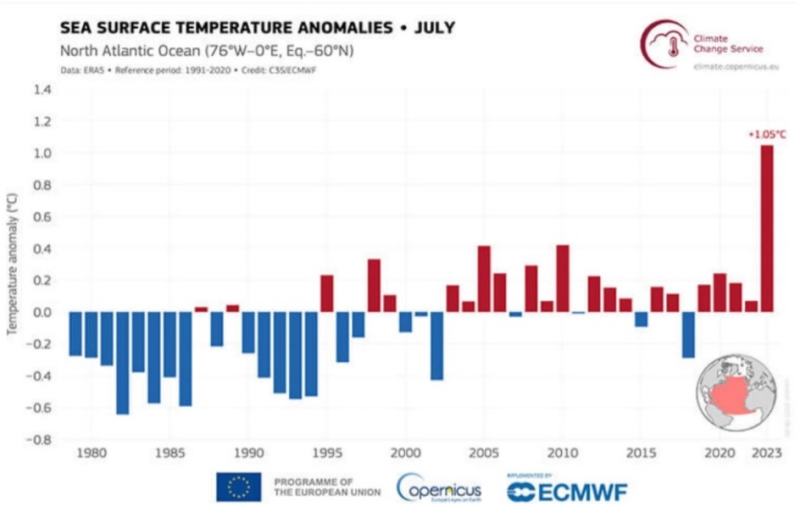Planet water: neither bread nor fish
- blog de bacosta
- 2135 lecturas
The fact that our planet is called "Earth" is a bit misleading as 70% of the surface of the globe is oceanic. About 50-80% of all life forms on Earth exist in the deep ocean. Every year, about a quarter of the carbon dioxide (CO2) emissions caused by human actions are absorbed by the ocean. This cycle may be disrupted as a result of climate change, endangering marine life and human food security.
Earlier notes discussed the climatic consequences on cereal harvests due to rising temperatures around the world. El Niño would exacerbate these effects, but not only on land, but also in the water. On 27 July, UN Secretary-General António Guterres announced that the era of rising global temperatures is over. Immediately, however, he warned that we are entering an era of "global boiling".
According to NASA estimates, July 2023 recorded a temperature increase of 0.24 degrees Celsius compared to any previously recorded July. It was also 1.18 degrees warmer than the average July between 1951 and 1980. The agency notes that the five warmest Julys since 1880 have occurred in the last five years.
 At the end of July 2023, the global average daily sea surface temperature reached 20.96 °C, surpassing the previous record of 20.95 °C set in 2016, according to climate analyses by the Copernicus service. During the period from 2015 to 2019, episodes of high ocean temperatures led to the disappearance of around 50 types of organisms, including corals and molluscs.
At the end of July 2023, the global average daily sea surface temperature reached 20.96 °C, surpassing the previous record of 20.95 °C set in 2016, according to climate analyses by the Copernicus service. During the period from 2015 to 2019, episodes of high ocean temperatures led to the disappearance of around 50 types of organisms, including corals and molluscs.
Unusual warming has been observed in the North Atlantic. In areas near the UK coast the water temperature has been more than 5°C above normal levels. Temperatures in the upper part of the Mediterranean Sea have reached an all-time high of 28.7 degrees Celsius, and in certain parts of the eastern sea, they have even exceeded 30°C.
The oceans play a crucial role in climate regulation. They act as a heat sink, generate about half of our planet's oxygen and influence weather patterns. When ocean waters become warmer, their capacity to absorb carbon dioxide decreases, which means that more of the gas responsible for global warming remains in the atmosphere. In addition, ocean warming can accelerate the melting of glaciers that flow into the sea, contributing to a more pronounced rise in sea level.
Rising temperatures have long-lasting effects on marine fauna, as mobile species will move in search of cooler habitats, potentially triggering imbalances in entire ecosystems. On the other hand, species that stay in one place are more susceptible to heat stress, as they lack the ability to migrate in search of more suitable conditions.
The latest report issued by the Intergovernmental Panel on Climate Change indicates that, in Australia, fisheries yields could fall by 3-10% if average global temperatures rise by 0.9-2.0 degrees Celsius above pre-industrialisation levels. If global warming continues unchecked and average temperatures rise by 2.4°C to 5.2°C, yields could fall by as much as 30%.
In Alaska, the combination of a heat wave at sea and an abundant growth of crabs seems to have been the cause behind the large number of deaths of this species, as the crabs experienced an increase in their metabolic activity due to the warmer waters and, as a result, ran out of sufficient food. It is very likely that rising temperatures in the oceans and rivers will also lead to a significant reduction in the chum salmon population.
For tunas, the change in water temperature threatens their development. A small increase in the Pacific bluefin tuna population is projected for the future. In contrast, five species, including Atlantic and southern bluefin tuna, swordfish, bigeye tuna and albacore, are estimated to experience declines in both total numbers and size, each at different rates. In some countries, fishermen abandon their work for this reason, for example, Sudan, where they catch a quarter of what is usual.
Ocean warming must not be ignored. The effects will not only be severe on the various marine species but also on humans. The oceans will absorb less CO2, large amounts of flora and fauna will be lost, and the lack of fish will put pressure on seafood prices as is already the case for agricultural products due to droughts and other extreme weather events.